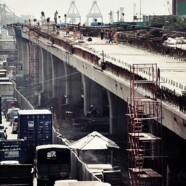Indonesia to Boost Financing for Roads and Airports
PT Indonesia Infrastructure Finance plans to raise by at least 60 percent the funding that the government-backed company provides to help build roads, power plants and airports in Southeast Asia’s largest economy.
The financial institution will increase loans this year to more than 4 trillion rupiah ($347 million), from 2.5 trillion rupiah last year, its President Director Sukatmo Padmosukarso said in Jakarta on May 2. Padmosukarso is meeting potential investors in Singapore today and then in Japan and Hong Kong on a roadshow, he said.

A traffic jam building up along a road constricted by a flyover still under construction. (Photo: AFP)
Indonesia’s Ministry of Finance set up the company in 2010 to provide long-term funding and help kick-start transportation and power projects across the archipelago, as the nation seeks to catch up with its neighbors in physical development. A lack of infrastructure is the main obstacle for investors, Mahendra Siregar, the country’s investment chief, said last month.
“The government really understands that Indonesia already lags behind neighboring countries on infrastructure,” Padmosukarso said in an interview.
Shareholders in the company include Indonesia’s government, the World Bank’s International Finance Corp. and Sumitomo Mitsui Banking Corp, according to Padmosukarso.
Foreign direct investment growth dropped to 9.8 percent in the January-March quarter, from 25.4 percent in the previous three months, according to government data. That contributed to first-quarter gross domestic product growth that missed economists’ estimates at 5.21 percent, data from the country’s statistics agency showed today.
New Airports
The Jakarta Composite Index pared gains after the GDP data. Foreign funds as of May 2 had bought $2.9 billion of Indonesian stocks on optimism for investor-friendly measures from a new government following presidential elections in July.
The company has capital of 1.8 trillion rupiah and is financing roads, hydropower plants, airports and seaports with loans of as much as seven years, Padmosukarso said. It is limited to financing a maximum 35 percent of each project.
It is also advising on plans to expand 10 small airports, he said. The government in December announced new rules that will allow foreigners to own as much as 49 percent of airports and 100 percent of power plants built under public-private partnerships.
“For airports, as long as passenger traffic is more than three million a year, it’s not difficult to invite investors,” Padmosukarso said. The revenue and risk outlook for power plants was also straightforward to determine, he said.
Weak Bureaucracy
For some toll roads, such as a plan to build one across the commodity-rich island of Sumatra, it’s trickier because of the uncertainty of traffic volume, he said. Land clearance was another major issue for building infrastructure, he said.
President Susilo Bambang Yudhoyono signed regulations in August 2012 that set a maximum completion time of 583 days for the land acquisition process for public projects, a measure that should help tackle this obstacle, said Eric Alexander Sugandi, a Jakarta-based economist at Standard Chartered Plc.
“The next problem is coordination at the level of central and local government,” Sugandi said by phone today. “And then the next problem is bureaucracy.” The country requires as much as 1,500 trillion rupiah of infrastructure and the government would need to provide more incentives for the private sector to make up for the state’s funding shortfall, he said.
Train Lines
Yudhoyono, whose second term ends this year, has struggled to deliver on his promise to build more roads, bridges and ports. Jakarta Governor Joko Widodo, who leads opinion polls to be the next president, has yet to detail his economic plans.
Since being elected governor in September 2012, Widodo has begun building a monorail in the capital and started construction on a metro train that had been delayed for years.
An Indikator Politik Indonesia poll released March 18 put him more than 25 percentage points ahead of his closest competitor for the presidency, former general Prabowo Subianto.
The Japan Bank for International Cooperation last week signed an agreement with a Japanese and an Indonesian lender to discuss rupiah financing for Japanese-affiliated companies. The two nations agreed to strengthen financial ties in May 2013 as Japan eyes Indonesia as an attractive investment destination.
Yudhoyono’s government has been relying on public-private partnerships, or PPP, to develop infrastructure and cover the funding shortfall, yet this has not been a success so far, Padmosukarso said.
“Slow implementation of PPP is mainly because the government is not ready in terms of project scoping and risk allocation between the government and investors,” he said.
source: Novrida Manurung / Bloomberg (editor: Stephanie Phang, Neil Chatterjee, Scott Lanman)

